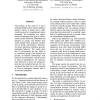Free Online Productivity Tools
i2Speak
i2Symbol
i2OCR
iTex2Img
iWeb2Print
iWeb2Shot
i2Type
iPdf2Split
iPdf2Merge
i2Bopomofo
i2Arabic
i2Style
i2Image
i2PDF
iLatex2Rtf
Sci2ools
SIGDIAL
2010
2010
Don't tell anyone! Two Experiments on Gossip Conversations
The purpose of this study is to get a working definition that matches people's intuitive notion of gossip and is sufficiently precise for computational implementation. We conducted two experiments investigating what type of conversations people intuitively understand and interpret as gossip, and whether they could identify three proposed constituents of gossip conversations: third person focus, pejorative evaluation and substantiating behavior. The results show that (1) conversations are very likely to be considered gossip if all elements are present, no intimate relationships exist between the participants, and the person in focus is unambiguous. (2) Conversations that have at most one gossip element are not considered gossip. (3) Conversations that lack one or two elements or have an ambiguous element lead to inconsistent judgments.
| Added | 15 Feb 2011 |
| Updated | 15 Feb 2011 |
| Type | Journal |
| Year | 2010 |
| Where | SIGDIAL |
| Authors | Jenny Brusk, Ron Artstein, David R. Traum |
Comments (0)

